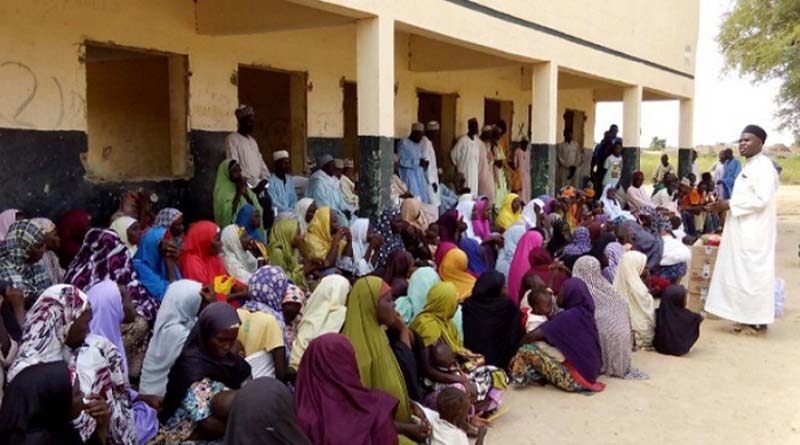MNCH2: Leveraging community structures for improved demand, uptake for RMNCH services in Kano
Maternal and neonatal mortality remains a huge challenge in the quest for achieving Universal Health Coverage (UHC) in northern Nigeria and particularly in Kano state, which accounts for a significant percentage of the high indices of maternal mortality in Nigeria.

Amongst others, this sad development is a result of low demand and uptake for quality maternal healthcare services, poor quality maternal and child healthcare services in healthcare facilities as well as socioeconomic and cultural factors hindering women and newborns from accessing quality healthcare in the region.
Therefore, since inception, the 5-year DFID-funded Maternal, Newborn and Child Health (MNCH2) programme being implemented in northern Nigeria, has been leveraging existing community structures to create demand and uptake for reproductive, maternal, newborn and child health (RMNCH) services towards improving the lives of women and children at the grassroots.
MNCH2 is widening access to integrated, cost-effective and quality primary health care services at the community level by building the capacity of stakeholders such as religious and traditional leaders, male motivators, volunteer drivers, traditional birth attendants (TBAs) as well as members of Facility Health Committees (FHCs) to create demand and uptake for the services.
So far, a total of 598 male motivators, 616 religious leaders, 486 TBAs from across 260 communities of Kano state have been trained by MNCH2 and are already facilitating the increase in demand and uptake for RMNCH services.
“Before now pregnant women in our community were not coming to access ANC and other services in our PHC but after we began mass sensitization the story changed. We work collectively using all available public gatherings to sensitize the people including wedding and naming ceremonies and even after prayers in the mosque,” says Yusuf Ibrahim, Chairman of the Facility Health Committee (FHC) for the PHC at Makuntiri, a very remote and hard-to-reach community in Bunkure LGA of Kano state.
Ibrahim added that women in Makuntiri were now not only taking their children to the healthcare facility when they fell sick instead they had also been sensitized to provide first aid services to children suffering from ailments like fever which entails soaking a clean cloth in water and massaging the bodies of the infants before taking them to a healthcare facility. He added that the community stakeholders and workers at its PHC were now working collectively which had helped created a sense of mutual trust among the duo.
“In the past we had to go to either Kura or Chiromawa to access ANC services, now we can do that here. TBAs from within our community are coming to sensitize and assist us during pregnancy and when a woman goes into labour and there are complications, the TBAs will assist in taking her to hospitals in Kura or Chiromawa; since our PHC doesn’t offer delivery services. We are advocating that our facility be upgraded so we can deliver of our babies here,” says Fatsuma Saleh, a mother of seven from Makuntiri community.
Harira Abdu is one of the TBAs sensitizing and assisting pregnant women on issues as varied as ANC and BCG vaccine in Makuntiri, who said in the past, there was no any kind of working relationship between the TBAs and PHC workers in the community, as such pregnant women would be in labour for as long as 3 days without being taken to the hospital.
“Now if there are complications like bleeding during labour we offer the woman first aid and ensure she is immediately taken to the hospital. We are now working 100% in collaboration with the healthcare workers in the community and beyond, unlike in the past when we didn’t have anything to do with one another,” said Abdu who had been working as TBA for decades.
Saidu Abubakar is a volunteer driver in Makuntiri who said until now his wife was never at the local PHC to access maternal healthcare services as such one of their children was born sick and weak while the mother developed many complications like stomach ache and vomiting after the child’s delivery.
He added that his older brother who was working as a security guard in Makuntiri PHC advised him to ensure the wife goes to the community PHC for ANC services when she became pregnant again, which he did.
“Having allowed my wife to go for ANC at our PHC during pregnancy our newborn child is now stronger and healthier than his older brother. Even though the child was delivered at home we took him to the PHC where the officer in charge examined and gave the child an injection and some medications. The mother this time around didn’t develop any complications after delivery.”
Gambo Musa is the focal person in charge of Maternal and Child Health (MCH) at the Kano State Primary Healthcare Management Board who said the system of demand creation introduced to the state by MNCH2 had helped “established unity among health workers, TBAs, and LGA-level MCH coordinators. Now, if a TBA takes a pregnant woman to a healthcare facility she will be attended to immediately as if she was brought by the facility’s staff.”
“There also an increased level of awareness among pregnant women on the importance of ANC and pregnancy-related complications. More women are now accessing maternal healthcare services as a result of the system of demand creation while the male motivators are working to address the challenge of men denying their wives the opportunity to access the services,” she said.
Auwal Fagge is the social mobilization officer for the Kano primary healthcare board who said the introduction of the system of demand creation had helped improved the demand and uptake for maternal and child health services in the state and positively impacted on the lives of women and children by reducing maternal mortality and morbidity and improving access to reproductive, maternal, newborn and child health (RMNCH).
“Demand creation involves all stakeholders at the community level; it gives room for interaction between community members and health workers, it gives them the opportunity to be part and parcel of demand creation. We now find it easy to mobilize people, create awareness and hence increase demand,” he said.
Unfortunately, despite the significant improvement in demand and uptake for RMNCH services in Makuntiri, their PHC doesn’t offer delivery services. And in spite of its highly remote and hard-to-reach nature, there is not a single vehicle in the community to transport pregnant women suffering from complications to nearby hospitals in Kura and Chiromawa hence they have to be transported on motorcycle, which is very unsafe for women in such conditions.












